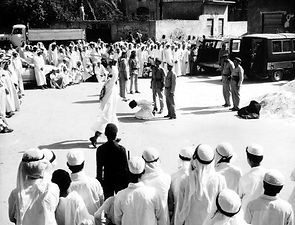Death Of A Princess (1980)
I neither commissioned, nor took editorial responsibility for Anthony Thomas’s Death Of A Princess, but this film had a huge steer on my television career.
Charles Denton handed ‘network features’, to me precisely because I had very little producer experience and none as an executive – his plan was that ATV’s top documentary producers, including Adrian Cowell, John Pilger and Anthony Thomas who produced “12 ‘features’ a year no more”, would work to me in name but remain ‘his’ in reality. Charles was excited by documentaries.
But of course it didn’t work out like that.
To free up Charles’s increasing workload as Director of Programmes, I quickly took overall responsibility for adult education, schools, religious and local programmes, as well as network features. Charles ‘kept’ Anthony Thomas, but not Adrian Cowell much to his chagrin (see later story), John Pilger and the expanding features team.
To understand Charles’s workload with Anthony Thomas’s films here are a few paragraphs from a report on Death of a Princess, written 25 years after it’s broadcast:
Before the film was publicly aired, several Saudi officials watched a private London screening and were deeply offended by it. The British government was informed that King Khalid was enraged by reports of the film's content. Informally, Saudi Arabia threatened to break off diplomatic relations and to suspend exports of oil to England. One account claims the Saudis offered more than $10 million to purchase the film outright to keep it from being shown. This was flatly denied by the Saudi Embassy in London, but people involved with the film indicated that some offer of payment had indeed been made.
On April 11, the Saudi Embassy in London called "Death of a Princess": "… an unprincipled attack on the religion of Islam and its 600 million people and on the way of life of Saudi Arabia, which is at the heart of the world of Islam."
On the twenty-third of April, the government of Saudi Arabia requested Great Britain to withdraw its Ambassador to Jeddah, James Craig. Although a serious step, it was thought to be temporary. The British Foreign Office said that the Embassy staff would stay in Jeddah and the Embassy would remain open.
(In the US) some of the industry officials of other ARAMCO companies were, at that time, said to be privately concerned that, if the film were shown, the Saudis might cut their oil production.
A day later, then acting Secretary of State Warren Christopher expressed reservations about the film. On May 9th, Mr. Christopher sent a letter to PBS president Lawrence Grossman relaying the concerns of the Saudi government, which had been expressed in a letter from Saudi Ambassador to the U.S., Sheik Faisal Alhegelan. In this letter, Christopher also conveyed his own reservations about the sensitive nature of the film's contents.
According to Hodding Carter, III, the State Department spokesman of the time, the decision to send the letter was by no means unanimous within the State Department. He himself, as well as his wife, Patt M. Derian, then serving as Assistant Secretary of the Bureau of Human Rights and Human Affairs, "thought it was inappropriate to do so," according to The New York Times.

